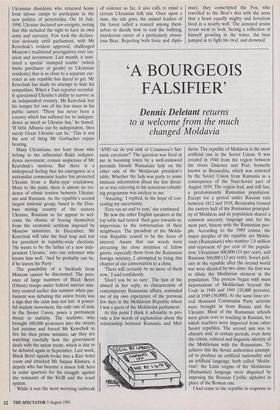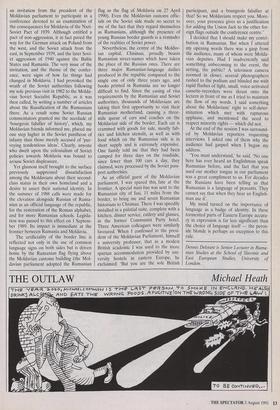`A BOURGEOIS FALSIFIER'
Dennis Deletant returns
to a welcome from the much changed Moldavia
`AND vat do you zink of Ceausescu's fan- tastic erections?' The question was fired at me in booming tones by a well-endowed peroxide blonde Rumanian lady on the other side of the Moldavian president's table. Whether the lady was party to some intimate information about the late dictat- or or was referring to his notorious rebuild- ing programme was unclear to me.
`Amazing,' I replied, in the hope of con- cealing my uncertainty.
`Zere vas no end to zem,' she continued.
By now the other English speakers at the top table had turned their gaze towards us, impervious to the conversation of their neighbours. The president of the Molda- vian Republic ceased to be the focus of interest. Aware that our words were attracting the close attention of fellow guests, especially those from the Rumanian foreign ministry, I attempted to bring this chapter of our conversation to a close.
`There will certainly be no more of them now,' I said confidently.
`Don't you be so sure'. The hint of the absurd in her reply, so characteristic of contemporary Rumanian affairs, reminded me of my own experience of the previous few days in the Moldavian Republic where I was a guest of the Moldavian parliament.
At this point I think it advisable to pro- vide a few words of explanation about the relationship between Rumania and Mol-
davia. The republic of Moldavia is the most artificial one in the Soviet Union. It was created in 1940 from the region between the rivers Dniester and Prut, formerly known as Bessarabia, which was annexed by the Soviet Union from Rumania as a consequence of the Nazi-Soviet pact of August 1939. The region had, and still has, a predominantly Rumanian population. Except for a period under Russian rule between 1812 and 1918, Bessarabia formed the eastern half of the Rumanian principal- ity of Moldavia and its population shared a common ancestry, language and, for the most part, history with the Rumanian peo- ple. According to the 1989 census, the major peoples of the republic are Molda- vians (Rumanians) who number 2.8 million and-represent 65 per cent of the popula- tion, Ukrainians 600,000 (14 per cent), and Russians 560,000 (13 per cent). Soviet poli- cies in the republic after the second world war were dictated by two aims: the first was to dilute the Moldavian element in the population. The process began with mass deportations of Moldavians beyond the Urals in 1940 and 1941 (10,000 persons), and in 1949 (36,000). At the same time sev- eral thousand Communist Party activists were brought in from Russia and the Ukraine. Most of the Rumanian schools were given over to teaching in Russian, for which teachers were imported from other Soviet republics. The second aim was to obscure and, at certain periods, even deny the ethnic, cultural and linguistic identity of the Moldavians with the Rumanians. To achieve this the Soviet authorities attempt- ed to produce an artificial nationality and an artificial language, both called 'Molda- vian'; the Latin origins of the Moldavian (Rumanian) language were disguised by imposing the Russian Cyrillic alphabet in place of the Roman one.
I had come to the republic in response to an invitation from the president of the Moldavian parliament to participate in a conference devoted to an examination of the consequences for Moldavia of the Nazi- Soviet Pact of 1939. Although entitled a pact of non-aggression, it in fact paved the way for the German attack on Poland from the west, and the Soviet attack from the east, in September 1939, and the later Sovi- et aggression of 1940 against the Baltic States and Rumania. The very issue of the invitation, and the theme of the confer- ence, were signs of how far things had changed in Moldavia. I had provoked the wrath of the Soviet authorities following my sole previous visit in 1982 to the Molda- vian Soviet Socialist Republic, as it was then called, by writing a number of articles about the Russification of the Rumanians there. As a result some Soviet Russian commentators granted me the accolade of `bourgeois falsifier of history', which, my Moldavian friends informed me, placed me one step higher in the Soviet pantheon of infamy than those merely accused of 'pur- veying tendentious ideas'. Clearly, anyone who dwelt upon the colonialism of Soviet policies towards Moldavia was bound to arouse Soviet displeasure.
Yet glasnost itself brought to the surface previously suppressed dissatisfaction among the Moldavians about their second- class status in their own homeland and a desire to assert their national identity. In the summer of 1988 calls were made for the elevation alongside Russian of Ruma- nian as an official language of the republic, for the restoration of the Roman alphabet, and for more Rumanian schools. Legisla- tion was passed to this effect on 1 Septem- ber 1989. Its impact is immediate at the frontier between Rumania and Moldavia.
The artificiality of the border line is reflected not only in the use of common language signs on both sides but is driven home by the Ruinanian flag flying above the Moldavian customs building (the Mol- davian parliament adopted the Rumanian flag as the flag of Moldavia on 27 April 1990). Even the Moldavian customs offic- ials on the Soviet side made no secret to me of the fact that they regard themselves as Rumanians, although the presence of young Russian border guards is a reminder of the realities of Soviet power.
Nevertheless, the centre of the Moldav- ian capital, Chisinau, proudly boasts Rumanian street-names which have taken the place of the Russian ones. There are three major Rumanian-language dailies produced in the republic compared to the single one of only three years ago, and books printed in Rumania are no longer difficult to find. Since the easing of visa requirements by the Rumanian and Soviet authorities, thousands of Moldavians are taking their first opportunity to visit their Rumanian motherland, causing a three- mile queue of cars and coaches on the Moldavian side of the border. Each car is crammed with goods for sale, mostly fab- rics and kitchen utensils, as well as with food which on the Rumanian side is in short supply and is extremely expensive. One family told me that they had been camped for three days on the roadside, since fewer than 100 cars a day, they claimed, were processed by the Soviet pass- port authorities. As an official guest of the Moldavian parliament, I was spared this fate at the frontier. A special mini-bus was sent to the Rumanian city of Iasi, 11 miles from the border, to bring me and seven Rumanian historians to Chisinau. There I was speedily installed in a palatial suite, complete with a kitchen, dinner service, cutlery and glasses, in the former Communist Party hotel. Three American colleagues were similarly favoured. When I confessed to the presi- dent of the Moldavian Parliament, himself a university professor, that as a modest British academic I was used to the more Spartan accommodation provided by uni- versity hostels in eastern Europe, he exclaimed: 'But you are the sole British participant, and a bourgeois falsifier at that! So we Moldavians respect you. More- over, your presence gives us a justification for adding the Union Jack to the other for- eign flags outside the conference centre.'
I decided that I should make my contri- bution in Rumanian. But when I uttered my opening words there was a gasp from the audience, many of whom were Molda- vian deputies. Had I inadvertently said something unbecoming to the event, the setting, the public? A television camera zoomed in closer, several photographers rushed to the podium and blinded me with rapid flashes of light, small, voice-activated cassette-recorders were thrust onto the lectern in front of me as I tried to maintain the flow of my words. I said something about the Moldavians' right to self-deter- mination which met with rapturous applause, and mentioned the need to respect minority rights — which did not.
At the end of the session I was surround- ed by Moldavian reporters requesting interviews. I asked one of them why the audience had gasped when I began my address.
`You must understand,' he said. 'No one here has ever heard an Englishman speak Rumanian before, and the fact that you used our mother tongue in our parliament was a great compliment to us. For decades the Russians have been telling us that Rumanian is a language of peasants. They cannot say that when they hear an English- man use it'.
My mind turned on the importance of language as a badge of identity. In these tormented parts of Eastern Europe accura- cy in expression is far less significant than the choice of language itself — the perox- ide blonde is perhaps an exception to this rule.
Dennis Deletant is Senior Lecturer in Ruma- nian Studies at the School of Slavonic and East European Studies, University of London.



















































 Previous page
Previous page